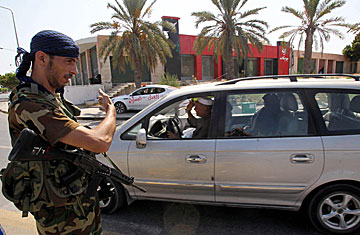
A rebel controls the traffic at a checkpoint in Tripoli, Libya, on Aug. 28, 2011
Under the scorching sun, Masoud Bwisir, 38, and his fellow rebels had just taken control of a checkpoint on Friday in the village of Tajura, 6 miles (10 km) east of the Libyan capital of Tripoli. All night, local youths manned the barricade — composed of nothing more than a few concrete blocks and some metal railing — but they wanted someone to take over, so they could pray in an adjacent mosque. And so Bwisir and his crew, still relatively fresh off a tugboat from Benghazi, relieved them of their duty.
A fighter signaled that a driver was refusing to open his trunk for inspection, and Bwisir went over. When the hatch was lifted, the rebels found 20 lb. (9 kg) of explosives underneath some plastic bags filled with debris. Local residents, who were watching from beyond the traffic circle, began to panic, but Bwisir, a businessman back in Benghazi, calmly dismantled the bomb. Throughout Tajura, Benghazi fighters are winning the confidence of the residents they have been tasked to protect. In doing so, they have calmed local residents' fears that the easterners have arrived to lord it over a region long accustomed to ruling Libya.
Having fought for six months against forces loyal to the ousted Libyan leader Muammar Gaddafi, units like Bwisir's have much more combat experience than the newly formed militias sprouting up in the capital over the past few days. They have put their skills to use by stamping out the deposed strongman's remaining forces, who are still refusing to accept their commander's defeat. "I haven't met many people from Benghazi and was worried that because they made the revolution, they would want to own the country," Ashraf Tresh, 34, said. "But the way their fighters have protected us with their courage and expertise, I am happy to welcome them."
Many there share Tresh's sentiments. On Saturday the local buzz was about a weapons depot the brigade found on a farm 5 miles (8 km) east of Tajura. Among the fig trees in the fields, Omar Ruba, 34, and his fellow rebels discovered a large warehouse full of Grad rockets and an assortment of gas masks and grenades. Gaddafi loyalists still active in the region had been using the farm to resupply their fighters who are spread over rural areas that have not been subdued by the rebels. "We know Gaddafi brigades are here and want to stop the revolution," explained Riyad Gofar, 43, a Tripoli crane operator, at a checkpoint on the dirt road near the farm. "But we don't have the men to patrol the whole place. These guys do." He then pointed to a pickup truck filled with Ruba's Benghazi fighters. "We are so happy they are here."
Tajura residents have expressed their gratitude to the Benghazi brigade in many ways. When the fighters returned to their makeshift camp in a local school, hot meals prepared by their neighbors were waiting. Soft goat meat topped with chickpeas in a thick red sauce was served with buckets full of dates on the side. "It's much hotter here than in Benghazi, and we can't talk to our families," said Ayub Legaha. "But the people here make the pains go away and make us feel like Libya is one," added the 23-year-old law student, grabbing a handful of dates.
When told about the appreciation Tajura residents expressed toward their new guests, rebel commander Anwar al-Muqrayaf grinned. Though he had slept for no more than 10 hours in the past five days, he was energetically giving orders and greeting locals who were asking him to solve their minor problems. "We came to protect the people here," he mumbled as a subordinate handed him a satellite phone. "Anything we can do to alleviate the problems in Tripoli, that is our task." His adjutant Fawzi bin Hamid concurred: "We have a mission here, and we won't stop until it is complete."
After gobbling down a few morsels of meat and picking at some chickpeas, Bwisir picked up his Kalashnikov and headed out into the courtyard of the school. A group of young men surrounded him, asking if the bomb sapper moonlighting as a guitar player could put on a short concert for the neighborhood. "Maybe tomorrow," he replied as his fans frowned. "Now I have to go out and get more Gaddafi brigades."
